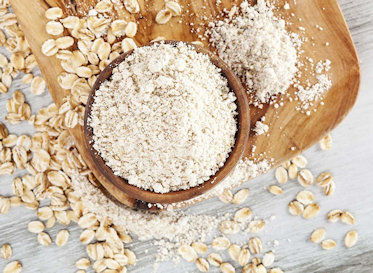|
Reduces Heart Disease Risk
A epidemiologic study published in the Archives of Internal Medicine looked at the relationship between dietary fibre intake and the risk of coronary heart disease (CHD) and cardiovascular disease (CVD) in 9,776 adults . The researchers found that subjects consuming the most fibre, 20.7 grams per day, had 12 percent less CHD and 11 percent less CVD compared to those eating the least amount (five grams per day) of fibre.
The subjects who ate the most water-soluble dietary fibre had even more impressive results with a 15 percent reduction in CHD risk and a 10 percent reduction in CVD risk. Oats contain both soluble and insoluble fibre. This research confirms that eating high-fibre foods, like oat flour, can help prevent heart disease.
Lowers Cholesterol
Another reason that oat flour is so great for the heart is that it’s been shown to lower LDL (“bad”) cholesterol. Specifically, it’s the beta-glucan (β-glucan) found mainly in the endosperm cell wall of oats that’s believed to be responsible for decreasing total serum cholesterol and LDL cholesterol. How does it work? Well β-glucan is a highly glutinous soluble fiber so as it travels through the small intestine, it actually limits the absorption
of dietary cholesterol.
Recent studies have shown that regularly consuming water-soluble, viscous-forming fibers like those found in oat flour can reduce total and LDL cholesterol levels by about 5 percent to 10 percent.
Helps Diabetics
Research shows that, in moderation, oats can be a healthy and helpful food for diabetics and others struggling with blood sugar issues. The aim of a 2015 scientific review was to figure out if oats intake is beneficial for diabetic patients. The researchers looked at 14 controlled trials and two uncontrolled observational studies, and the findings are quite impressive.
Compared with the controls, “oats intake significantly reduced” the concentrations of A1c and fasting blood glucose as well as total cholesterol and LDL cholesterol. The conclusion of the review is that oats intake can benefit both blood sugar control and lipid profiles in type 2 diabetics, making it a great addition to any diabetic diet plan.
Decreases Blood Pressure
Oat flour made from pure whole oats may also help your blood pressure numbers. A recent study shows that adding oats to a standard American diet can help reduce both systolic and diastolic blood pressure in people with mild or borderline hypertension. Specifically, the subjects who added soluble fibre-rich whole oats to their daily diets experienced a 7.5 unit drop in systolic blood pressure and a 5.5 unit reduction in diastolic blood pressure.
Meanwhile, the control group had “virtually no change” in either systolic blood pressure or diastolic blood pressure.
Satiety Star
If you’ve ever eaten a bowl of oatmeal for breakfast, you’re familiar with how oats can hold you over really well until your next meal. Since oat flour is really just ground-up whole oats, adding it to your meals and recipes can also help you feel more satisfied after consuming it.
Scientific research published in the European Journal of Clinical Nutrition aimed to produce a validated satiety index of common foods. Many different foods were tested, and oatmeal ended up being rated No. 1 among breakfast foods and No. 3 overall. A scientific review published in 2016 suggests that it’s likely the beta-glucan content of oats that has such a positive effect on perceptions of satiety.
|

